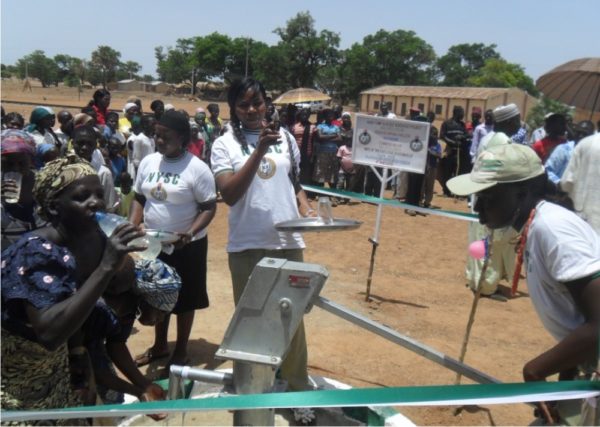Features
BN Book Excerpt: The Girl Who Found Water by Chibuzor Mirian Azubuike
 One day, a few of us went on an assignment to a village called Bigi Tudunwada in the Bauchi LGA. A population of over 6000 drank from only one well and as a result often suffered from bad health conditions. I immediately made up my mind to do something. I wrote to the NYSC secretariat seeking permission to take this up as a community development project. I also sewed uniforms for pupils who had none.
One day, a few of us went on an assignment to a village called Bigi Tudunwada in the Bauchi LGA. A population of over 6000 drank from only one well and as a result often suffered from bad health conditions. I immediately made up my mind to do something. I wrote to the NYSC secretariat seeking permission to take this up as a community development project. I also sewed uniforms for pupils who had none.
Months passed and it was time for Christmas. I wrote for approval and traveled home to see my family. I ate and drank and added some weight. When the holiday was over, there was pressure on me not to go back to Bauchi. This was because Boko-Haram had threatened all the southerners in the north. Northerners in the south, especially those in Onitsha, were also leaving. Everyone was calling me, asking me not to travel again. My parents were scared. But I took my luggage and headed to Bauchi. Most of the corps members had not returned; the few who were around did not travel during the holiday. When my relatives called and I told them I had traveled back, they asked why I did not value my life. They were angry because not only did I travel back, but I was also living adjacent to a church which was a target.
Amaka’s husband asked why I didn’t at least pity my parents, who had struggled to put me through school. He had promised to help me redeploy, but six months had passed and I had heard nothing. I had come to realize that it was useless to rely on empty promises, and better to focus on my projects and make something meaningful out of my service year.
After the fuel subsidy strike I was called from the secretariat to collect approval to commence my water project. I drew out a strategy on how to get resources from ministries, parastatals and individuals. I was optimistic the project would be a success.
Often on weekends, other corps members would spend time at the lodge. We would relax and have fun. One night we had slept late, and at 2:45am we heard a loud bang. There was smoke everywhere and our windows were shattered. We woke up and ran out of our rooms in various states of undress. The male corps members carried cutlasses and prowled around outside.
The other girls and I were gathered in the common room praying. Cynthia and Miriam cried as the broken glass fell on their bodies. I remembered the SSS number that we were given in camp to call in times of distress. I dialed the number and a male voice answered. I narrated the incident and told them our location. In fewer than five minutes they called and told me they were in their vehicle, circling the church. They told me to calm the other corps members down and that there was no problem. Cynthia had cried so much that her crying induced other girls to cry more. At about 4:30 everywhere seemed calm and we went back to sleep.
When daylight came we noticed that part of the fence was damaged. It was then that we realized that the noise we had heard was dynamite detonating, but we had thought it was further away. People began to gather at the church; even neighboring houses were affected by the explosion. Uniformed men came to investigate; we were also told that something similar took place at another church near the railway.
By this point everyone was scared. It was a Sunday and we usually had mass at 7am; those that came to church went back home after seeing the damage. The press was all around asking questions, but as corps members we were not to speak to them. We contacted the NYSC local government inspector, who showed up quickly with other NYSC officials. He addressed us briefly, and all of the corps members began agitating, stating that they wanted to go home. He asked us to write down our demands, and I was given the task of writing the letter. They insisted I write that we all be relocated automatically or be sent home as we did not feel safe. I suggested that we include the option of armed security men guarding where we lived. After a long period of argument, they finally agreed with my option and we all signed our names. I was in a dilemma because I did not want to leave Bauchi without achieving anything.
The villagers for whom I intended to construct a borehole called to sympathize with me when they heard the news. One thing was clear to me at this point; I was gradually deviating from doing the project because of any award but because of the dying need of this vulnerable people. Their encouragement and constant phone calls made me determine to continue with the project.
By evening we were calm and even joked about our reactions to the events of the night before: Ifeoma had brought out her olive oil and prayerfully applied it to her face, while Miriam her roommate stretched out her out hands and begged Ifeoma to give her some too.
 The next morning most of us received phone calls from our parents who had heard about the events on the network news; we calmed them down. The Bauchi NYSC state coordinator as well as the bishop of the Catholic diocese of Bauchi visited and encouraged us. The police safeguarding our residence made us secure.
The next morning most of us received phone calls from our parents who had heard about the events on the network news; we calmed them down. The Bauchi NYSC state coordinator as well as the bishop of the Catholic diocese of Bauchi visited and encouraged us. The police safeguarding our residence made us secure.
___________________________________________________________________________________
Chibuzor Mirian Azubuike is writer that is committed to social change. In her free time she likes to cook. She graduated from the University of Benin, Edo State and currently presents motivational talks at NYSC orientation camps. She is a recipient of NYSC state honours award and several commendations as a result of her laudable projects. Her future plans are to set up an NGO that is geared at mobilizing development at the grass root. She can be reached at www.chibuzormirian.com





















